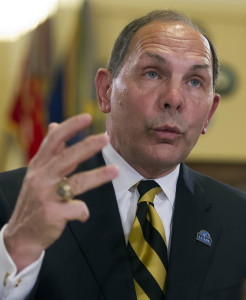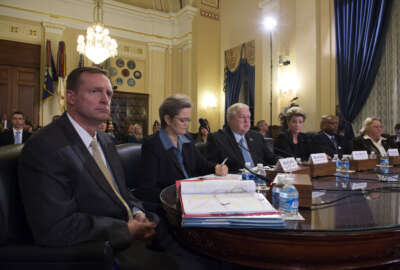
VA unveils new SES accountability options as Senate fast-tracks vets omnibus
Accountability in the Senior Executive Service will be at the center of congressional discussions on a new omnibus legislative package for the Veterans Affairs...
The Veterans Affairs Department is changing its tune on new accountability provisions that it wants Congress to include in a forthcoming comprehensive legislative package.
New proposals from VA Secretary Bob McDonald would reclassify medical center and Veterans Integrated Service Network directors, as well as other health care executives, under Title 38. The secretary would have the authority to hire, set pay, appraise and discipline those senior executives.

The VA also is proposing an overhaul of the current, expedited disciplinary appeals process under the Veterans Access, Choice and Accountability Act of 2014 (Choice Act). Most senior executives at VA not in the medical field would remain under Title 5, McDonald said. But he wants Congress to authorize the presidentially-appointed members of the Merit of Systems Protection Board — rather than MSPB administrative judges — to decide disciplinary appeals cases.
“Because of the restrictions in the Choice Act, the judges in the MSPB, I think if they were here to defend themselves, they would say the 21-day limit, the fact that they couldn’t provide any remediated punishment, hemmed them in,” McDonald said during a March 15 legislative hearing before the Senate Veterans Affairs Committee. “The changes that we’ll make will add greater clarity and give more weight to the secretary’s interest in the process.”
“We believe that there was, perhaps, greater adherence to MSPB precedent [and] less appropriate deference to the secretary’s actions in the cases that we’ve had so far,” said Meghan Flanz, deputy general counsel for legal operations and accountability at the VA’s Office of General Counsel.
Accountability is at the core of a major omnibus package of veterans legislation under consideration in the Senate Veterans Affairs Committee, which Chairman Johnny Isakson (R-Ga.) said should be finished and ready for floor debate by April 1.
“The accountability piece is the linchpin for me,” Isakson said March 15. “What happened in Philadelphia and what happened with the Merit Systems Protection Board overturning your action in those two situations sent a terrible signal across the country and misrepresented, in my judgment, what really goes on at the VA.”
The initial proposal, which McDonald first mentioned publicly during a budget hearing before the House VA Committee, would have reclassified roughly 300-to-400 members of the department’s Senior Executive Service from Title 5 to Title 38.
“The draft language submitted to you was not the department’s, nor the administration’s, proposal,” McDonald said in his written testimony before the Senate committee. “It was an idea brought up due to internal collaborative discussions, which are fostered as part of the MyVA initiative, and was sent to the committee for discussion purposes.”
Yet that proposal is sparking harsh criticism from current and former VA executives.
The majority of the 236 people that responded to a recent survey from the Senior Executives Association said the proposal would not help VA hold SESers accountable for poor performance and misconduct.
Nearly 80 percent of respondents said the move to Title 38 would not give executives adequate due process and appeal rights, SEA’s detailed findings said.
Veterans of Foreign Wars voiced similar concerns for VA’s SES.
“While the VFW has full faith and confidence that the VFW will strengthen rather than erode VA’s SES core, the VFW does not want future political appointees to politicize VA’s career civil servants,” Carlos Fuentes, senior legislative assistant for VFW, told the committee.
Since Congress passed the Choice Act in 2014, McDonald said he’s using the lessons the department learned to continually refine new ideas on SES accountability.
For Isakson, all VA SESers should be hired under Title 38 and the VA secretary should have the final authority to hire and fire them. And as Isakson indicated, the fate of the veterans omnibus will hang on the accountability issue, which won’t likely disappear any time soon.
VA issued proposed removal notices for three senior executives at the Phoenix Health Care System, for example, on the same day as the Senate legislative hearing.
Changes to veterans disability appeals process under consideration
The omnibus package also could include sweeping overhauls to the Choice Program, which lets veterans find health care outside of the department under specific circumstances.
The committee and the VA also are considering major changes to the veterans disability appeals process. The VA is meeting again with leaders from several leading veterans’ service organizations on Thursday, McDonald said, to refine its legislative proposal.
The omnibus is moving fast, said Isakson, who indicated he wanted to see the legislation land on the President’s desk by Memorial Day at the latest.
“We are on the cusp; we’re not there yet,” he said. “We’re on the cusp of being able to bring to the floor of the United States Senate a major comprehensive omnibus veterans bill, get it passed through the Senate, get it to the House and find out where, if any places we’re going to have disagreements, and then get it to the President’s desk for his signature.”
The forthcoming legislation comes after months of discussions with McDonald, leadership in the House Veterans Affairs Committee and even White House Chief of Staff Denis McDonough, Isakson said.
Members of the committee and the VA echoed Isakson’s need for speed.
When McDonald spoke to House Veterans Affairs Committee Chairman Jeff Miller (R-Fla.) after he announced his plans to retire at the end of the congressional term, McDonald said “the time is now” to pass comprehensive veterans legislation.
Sen. Richard Blumenthal (D-Conn.), ranking member of the committee, called it a “breakthrough moment for the Veterans Choice Program.”
“It’s a moment, it’s a good step, a very positive way forward, a path that ought to be pursued,” he said. “There will be a lot more after today to be done, and we’re near the finish line. I hope we can cross it.”
Sen. Jon Tester (D-Mont.) introduced the Improving Veterans Access to Care in the Community Act, one of many pieces of the veterans omnibus. Tester’s staff has been rewriting and revising the bill as it continues its conversations with McDonald — discussions that continued in the minutes before Tuesday’s hearing.
“Every once in a while you get to feel good about stuff we do in this body,” Tester said. “This is one of those moments, where my staff, Burr’s staff, the secretary’s staff, both of your [Isakson and Blumenthal’s] staffs helped us get to the point where we have something we think is acceptable. But to be honest with you, we haven’t accomplished one thing yet. Hopefully with the leadership … we can get this thing done.”
Copyright © 2025 Federal News Network. All rights reserved. This website is not intended for users located within the European Economic Area.
Nicole Ogrysko is a reporter for Federal News Network focusing on the federal workforce and federal pay and benefits.
Follow @nogryskoWFED






